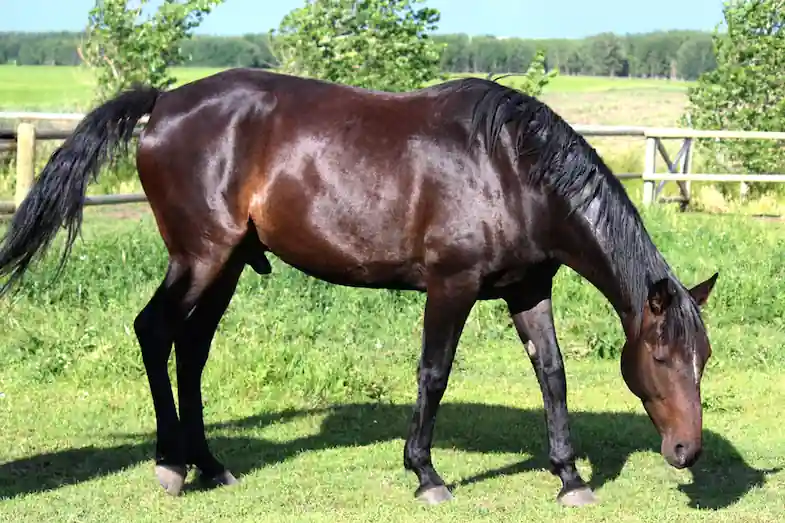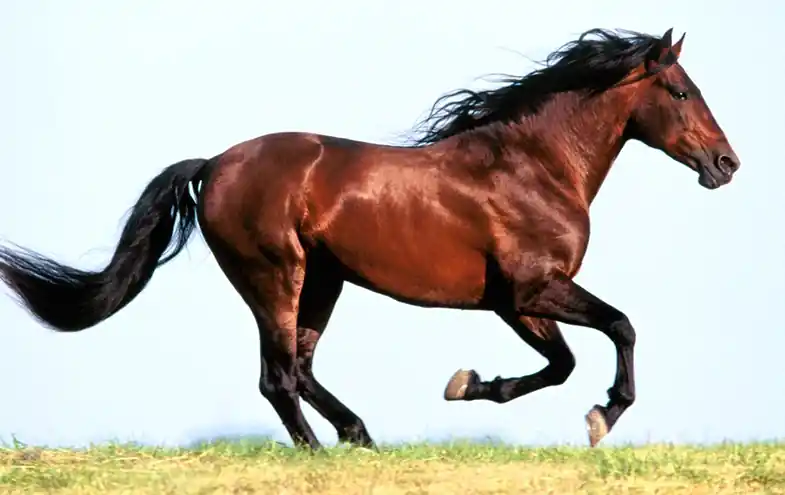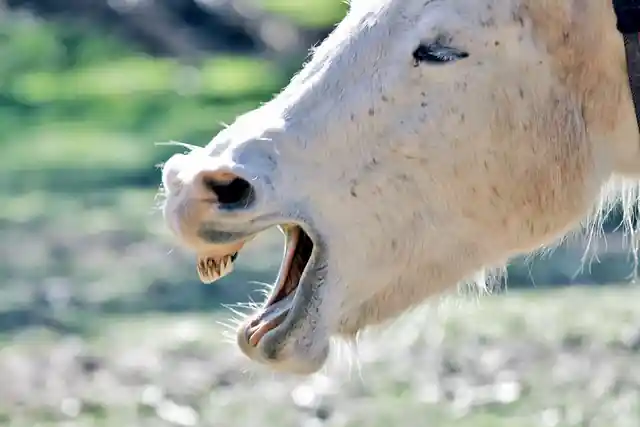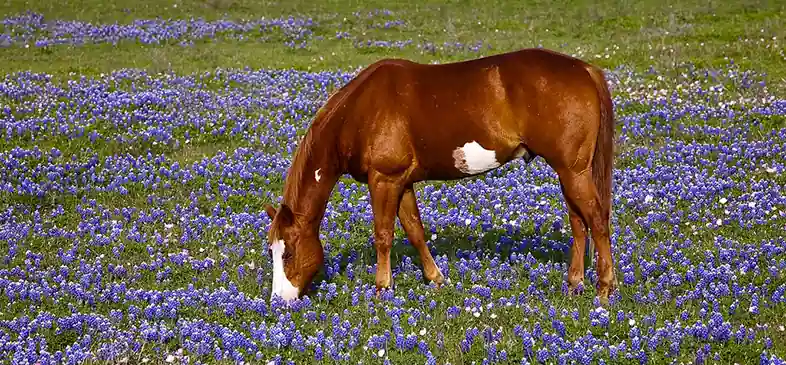Last Updated on January 6, 2022 by Sam
Horses are herbivores and have a very different digestive system from humans. In fact, horses don’t actually have stomachs. They digest food in the small intestine before it moves to the large intestine where its waste is absorbed into the bloodstream through their lungs and sent back out as carbon dioxide or simply exhaled with no harm done to them. Horses can’t vomit because they lack an esophagus!
Horses can’t vomit because they have a stomach redundancy that prevents them from vomiting.
You may have be aware that horses are unable to vomit, but do you know why? Neither did I until recently; I assumed it was because they didn’t have a gallbladder, but it turns out that their lack of one isn’t the cause of their inability to vomit.
Why are horses unable to vomit? Because of the strength of their cardiac sphincter, horses are unable to vomit (the muscle around the esophagus that leads into the stomach). Because this muscle is so powerful, after food has passed through it, it will not open again, functioning as a one-way valve that prevents stomach contents from traveling back up the esophagus.
Aside from the cardiac sphincter, there are a variety of additional reasons why a horse can’t vomit. The stomach of a horse is positioned at a more acute angle (in regard to the esophagus) than that of most other animals, which means that even if the valve could open to allow food to back up, it would be very difficult for the food to do so. Horses haven’t evolved to be able to vomit because of this, along with a very weak and poorly developed vomiting reflex.
Why wouldn’t a horse vomit?
Nobody knows for sure why horses haven’t acquired the capacity to vomit, but there are two very plausible explanations, both of which involve the survival instinct. A third reason why horses can’t vomit exists, although it’s more of a hypothesis than anything else.
Picky eaters
While your domesticated horse may consume something and then consider the ramifications, wild horses are incredibly picky eaters who typically know what is and isn’t acceptable to them. This implies that horses will nuzzle their way past a poisonous plant in order to reach the ‘good to eat’ plant behind it. This, along with the fact that horses are perpetual grazers with tiny stomachs (meaning they only consume little quantities at a time that pass through the stomach in 15 minutes or less), implies they haven’t developed the capacity to vomit since they didn’t absorb any poisons, or just a small quantity. Unfortunately, this isn’t always the case in a domestic setting, and horses are exposed to plants they wouldn’t ordinarily see in the wild, which is why we must be so cautious about what we give them. These articles can assist you if you are unsure about what you should and shouldn’t feed your horse:
a quick escape
Horses have always required to be able to run at a moment’s notice and as quickly as they can since they are predatory animals. Because of this demand for speed, a horse’s gut is intended to move back and forth, providing the horse the flexibility and lung room to gallop at speeds of up to 88 kilometers per hour (55 mph). While this may not seem important, the continual movement of the intestines causes a hammering motion on the stomach, which would cause vomiting in most other animals. This implies that if a horse’s vomit reflex was greater, it would vomit every time it ran, wasting precious nutrients at best and risking being captured by a predator at worst.
Overeating
Horses are continually moving food through their digestive systems due to their regular grazing behavior, which implies they don’t tend to overeat or binge on their food, at least in the wild. This implies that their stomachs are seldom full, and they don’t need to vomit to get rid of extra food or gases, despite the fact that, as we all know, they’re more than capable of doing it from the other end!
Horses may look to vomit at times, but they aren’t.
Some individuals claim to have witnessed a horse vomit, although this is nearly never the case. Although it may look that a horse is vomiting, this is due to the fact that the food (or other substance) is coming through their esophagus rather than their stomach. Instead, it’s more than probable that they’re regurgitating or choking.
Regurgitating
Regurgitation, unlike vomiting (which is a muscular activity), is a passive action in which eaten food that hasn’t made it to the stomach seeps out of the mouth and, more often, the nose. There are many causes for this, the most frequent of which is a disease called as grass sickness. This occurs when the section of the horse’s nervous system that regulates the gut is injured, causing the esophageal muscles to relax and become loose. This prevents all of the food from reaching the stomach and causes discharge instead. If this occurs to your horse, you should seek guidance from your veterinarian.
Choking
Horses, like humans, may get food trapped in their throats and can arch their necks and elevate their heads to try to release it; however, unlike humans, this does not impact their breathing. Choking may be hazardous (and stressful for the horse) even if it doesn’t impact their breathing, so remove whatever’s trapped as quickly as possible or, if you can’t, contact your veterinarian right away. While you’re waiting for aid, make sure your horse isn’t hungry or thirsty, and try to keep them quiet if at all possible.
What are the benefits of a horse’s inability to vomit?
It’s unknown if horses became picky eaters as a result of their inability to vomit or whether they never acquired the capacity to vomit as a result of their picky natures, but one thing is certain: contemporary horses have an intrinsic ability to discern what’s healthy for them and what isn’t.
The fact that horses cannot vomit has served to preserve their esophagus from acid injury, in addition to assisting their survival. This is because horses create stomach acid all of the time (even when they aren’t eating) to aid in the rapid digestion of their meal. In fact, they may create up to 60 gallons (60 liters) of acid every day, which would cause catastrophic damage to the esophagus if the valve didn’t remain closed.
What are the drawbacks of horses’ inability to vomit?
Many of us would assume that not being able to vomit is a huge benefit with no drawbacks, but animals (and people) need to vomit for a purpose (usually to expel poisons or alleviate stomach pressure), and horses are no exception. They can’t vomit, but it doesn’t imply they don’t have the same problems.
While a horse may still consume poisons or need to expel stomach gases (usually because they’ve been given something nasty), vomiting is definitely not an option. Instead, they’re more likely to have severe digestive problems or consequences like colic or a burst stomach.
Is it possible to make my horse vomit anything they’ve eaten?
Whatever you do, don’t offer your horse anything that will make them vomit; it will just make things worse and might be fatal. If you suspect your horse has eaten anything poisonous or is suffering from another major digestive problem, don’t wait to contact your veterinarian. In certain circumstances, doing so might mean the difference between life and death.
You should also keep your horse away from anything harmful and provide him with lots of fresh water to drink, as this may help flush some of the toxins out of his system. Remove everything he may ingest until your veterinarian sees him.
Will the horses perish if it vomits?
If a horse is really vomiting, there is a good probability they will die. This is because, although throwing up is exceedingly difficult for a horse, it is not absolutely impossible and usually accompanies irreversible stomach damage. If your horse is vomiting (rather than choking or regurgitating), you must immediately contact your veterinarian. The reason it’s so crucial is that if a horse vomits, it’s extremely probable that an organ in their digestive system has burst (most commonly their stomach but not always). The muscles of the cardiac sphincter have collapsed as a result of the rupture, allowing food and gases to travel back up the esophagus.
Your veterinarian may not be able to save your horse’s life (though in certain situations they can), but they can surely make them feel better.
Do horses have the ability to burp?
Burping is not possible for horses since it requires the same muscles and motions as vomiting. Vomiting and burping are, for all intents and purposes, the same process, and they use the same muscles. They both enable food (in the case of vomiting) and air (in the case of burping) to move from the stomach back up the esophagus. If your horse has gas in his stomach, he will move it via his digestive system and out out his anus instead.
Some horses may seem to be burping, but the air is coming from their esophagus rather than their stomach, and this is usually caused by vices like windsucking or cribbing. The air goes down the esophagus and then back up and out of the mouth in these circumstances; it never hits the stomach, so it isn’t exactly a burp.
Additional reading
- Is it safe for horses to eat damp grass?
- What you need to know about caring for your new horse
- When a horse is lame, what does it mean?
- Horses exhibit their teeth for a variety of reasons.
- Is your horse drinking enough water?
- Horses paw at the ground for a variety of reasons.
- Maintain a horse on a tight budget without sacrificing quality.
- How to give your horse treats safely
- Your queries on equine euthanasia have been addressed.
- 7 Surprisingly Healthy Foods for Your Horse
Products that are suggested
I’ve tried hundreds of different horsey goods over the years, from various blankets and halters to various goodies. I’ve liked some and disliked others, but I wanted to share with you my top all-time favorite goods, the ones I never leave the yard without. I’ve given links to the goods that I believe are fantastic (in no particular order).
- Mane and Tail Detangler – Even if you never exhibit your horse, you’ll need to disentangle his tail (and maybe his mane) from time to time, which is always a difficult task! I’ve discovered that running a little detangler through my horse’s tails every few days keeps them from mattifying and makes combing them simple, even when they’re covered in muck. It also works wonderfully on my hair, which I’m not sure whether I should disclose or not.
- TAKEKIT Pro clippers – I’ve tried a number of various clippers over the years, and although some were clearly better than others, these were by far the finest. They’re heavier than many other clippers, which I think is a good thing since it makes them seem more solid and durable. Furthermore, they come in a variety of speeds, making them as effective at trimming your horse’s back as they are his face. I also enjoy that they come with a convenient travel bag, although that isn’t for everyone. The firm that manufactures them is fantastic, and they’re also really helpful, which is a huge plus these days. The only thing I didn’t like about it was that it didn’t come with any oil, but it’s not a big deal since lubricant isn’t hard to get by.
- Shire’s ball feeder — There are a plethora of boredom-busting toys available, but I like to use them on a daily basis, regardless of whether or not my horses are bored. I found that giving my horses with treats (or pieces of fruit) not only encourages them to solve problems, but it also mirrors their natural grazing activity, which helps to keep them relaxed and de-stressed.
- Horse safe mirror – This is an odd one that many people are startled by, but I prefer to have horse safe mirrors in the trailers and quarantine stalls. It helps to alleviate feelings of loneliness by creating the idea that there are other horses around. Horses, like herd animals, may get severely anxious if they think they are alone, but with these stick-on mirrors, they assume at least one other horse is around.
I hope you found this post to be informative. If you do, I’d like it if you could share it with me since it would be quite helpful.
Watch This Video-
Horses are unable to vomit because they have a short esophagus. They can only vomit if the food is able to pass through their throat and into their stomach. If it’s not, the food will leave their mouth and be spit up later. Reference: horse throwing up water.
Related Tags
- what happens when a horse throws up
- why can’t rats vomit
- why can’t rabbits vomit
- can a horse vomit
- do horses die if they throw up



